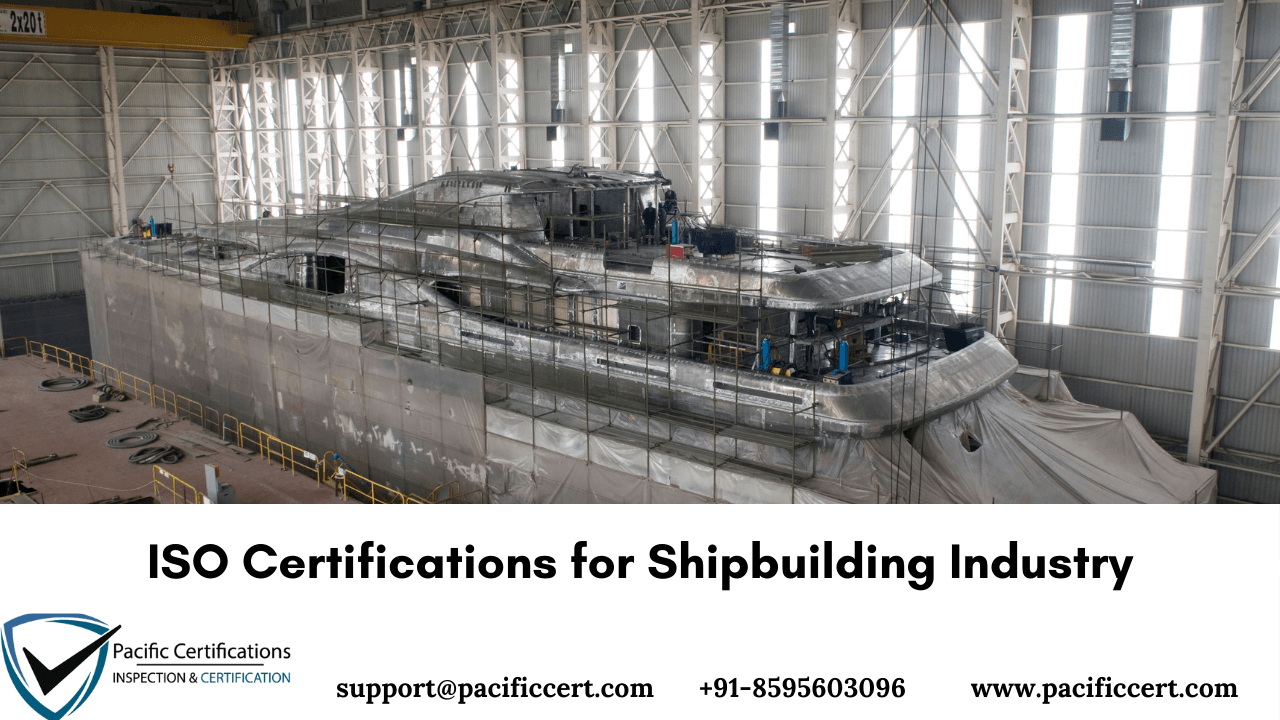ISO Certifications for Shipbuilding Industry, Requirements and Benefits

Introduction
Shipbuilding is a critical industry that underpins global trade, defense, offshore energy, and marine transportation. With more than 90% of global trade carried by sea, the reliability of ships is directly tied to the stability of global supply chains. The shipbuilding sector, valued at over USD 150 billion annually, involves highly complex engineering and massive capital investments.
Shipyards face growing challenges: stricter environmental regulations, rising energy costs, safety concerns, and demands for higher-quality vessels. ISO certifications help shipbuilders manage these challenges through internationally recognized systems that improve quality, compliance, risks, and sustainability.
In shipbuilding, ISO certifications create the foundation for quality, safety, and sustainability across one of the world’s most complex industries
If you are looking for ISO Certification for your shipbuilding business, contact us today at [email protected].
Quick Summary
ISO certifications help shipbuilding companies improve quality, safety, and sustainability. Key standards include ISO 9001(quality), ISO 3834 (welding), ISO 14001 (environment), ISO 45001 (safety), and ISO 30000 (ship recycling). Certification builds compliance with IMO regulations, increases credibility, and ensures shipyards preserve a leading position globally
Applicable ISO Standards for Shipbuilding Industry
The shipbuilding industry is subject to various ISO standards that help ensure the quality and safety of shipbuilding processes and products. Here are some of the applicable ISO standards for the shipbuilding industry:
ISO 9001: Quality Management System (QMS):
ISO 9001 sets the standards for quality management systems and is widely applicable to the shipbuilding industry. Shipbuilders can use this certification to demonstrate their commitment to quality in design, construction, and maintenance of ships.
ISO 14001: Environmental Management System (EMS):
Given the environmental impact of shipbuilding, ISO 14001 certification helps shipbuilders manage their environmental responsibilities, reduce environmental impacts, and comply with environmental regulations.
ISO 45001: Occupational Health and Safety Management System (OHSMS):
Shipbuilding involves various occupational hazards, and ISO 45001 certification ensures that shipbuilders have effective safety measures in place to protect workers from accidents and occupational illnesses.
ISO 50001: Energy Management System (EnMS):
Shipbuilding consumes significant energy resources. ISO 50001 helps shipbuilders establish energy management systems to improve energy efficiency, reduce energy costs, and minimize their environmental footprint.
ISO 3834: Welding Quality Requirements:
Welding is a critical process in shipbuilding, and ISO 3834 provides guidelines for the quality requirements of fusion welding processes, which are vital for ship construction.
ISO 8501: Preparation of Steel Substrates Before Application of Paints and Related Products:
ISO 8501 provides standards for the preparation of steel surfaces before applying protective coatings. This is crucial for preventing corrosion on ships.
ISO 12944: Corrosion Protection of Steel Structures by Protective Paint Systems:
This standard offers guidance on protecting steel structures, including ship hulls, from corrosion using protective paint systems.
ISO 19901-5: Site-specific Assessment of Mobile Offshore Units (MOUs):
Relevant for offshore platforms and mobile offshore units used in the offshore industry, including those involved in ship construction or maintenance.
ISO 1478: Shipbuilding and Marine Structures — Welding of Aluminium Alloys:
For shipbuilders working with aluminum alloys, this standard outlines welding requirements and procedures.
These standards ensure the safety, quality, and environmental responsibility of shipbuilding processes, from design and construction to maintenance and operation.
What are the requirements of ISO Certifications for Shipbuilding Industry?
Obtaining ISO certifications for the shipbuilding industry involves meeting specific requirements. Below are the general steps and requirements for obtaining ISO certification in the shipbuilding industry:
General requirements:
Define the scope of the management system covering design, procurement, fabrication, assembly, and testing activities.
Establish quality, environmental, and safety policies approved by top management and communicated throughout the workforce.
Maintain documented processes for design review, material traceability, inspection, and non-conformance handling.
Conduct risk assessments addressing welding defects, environmental emissions, and occupational hazards in workshops and dry docks.
Ensure compliance with international maritime regulations, ship classification rules, and local environmental laws.
Implement welding process control systems in accordance with ISO 3834 for hull integrity and structural safety.
Maintain equipment calibration and inspection logs for measurement reliability and quality assurance.
Provide regular training for welders, engineers, and inspectors to ensure technical competency.
Carry out internal audits and management reviews to evaluate compliance, safety performance, and continual improvement.
Protect digital assets such as ship design data and project documentation under ISO/IEC 27001 protocols.
Specific requirements:
ISO 9001: Quality Management System (QMS) Requirements:
Documentation: Maintain proper records of processes and quality control.
Customer Focus: Ensure products meet customer requirements.
Process Control: Standardize shipbuilding processes to enhance efficiency and quality.
Continuous Improvement: Implement corrective actions for ongoing improvement.
Supplier Management: Ensure suppliers meet quality standards.
ISO 14001: Environmental Management System (EMS)
Environmental Impact Assessment: Identify and manage environmental risks.
Legal Compliance: Adhere to local and international environmental laws.
Waste Management: Efficient waste reduction, recycling, and disposal practices.
Energy Use Optimization: Improve energy efficiency in shipbuilding processes.
Pollution Prevention: Implement controls to reduce emissions and prevent pollution.
ISO 45001: Occupational Health and Safety Management System (OH&S):
Risk Assessment: Identify hazards and assess risks to shipyard workers.
Health and Safety Procedures: Implement safety protocols to prevent accidents.
Training Programs: Provide safety training for workers in hazardous environments.
Incident Management: Establish systems for reporting and investigating incidents.
Legal Compliance: Ensure compliance with occupational health and safety regulations.
Tip: Shipbuilders should begin with ISO 9001 for quality, ISO 45001 for safety, and ISO 14001 for environment, then add ISO 3834 for welding and ISO 30000 for recycling to meet marine regulations.
What are the benefits of ISO Certifications for Shipbuilding Industry?
Obtaining ISO certification in the shipbuilding industry improves overall operations and ensuring compliance with international standards. Here are some of the key benefits of ISO certification for the shipbuilding industry:
Consistent quality in vessel design, welding, and assembly.
Safer workplaces with reduced accident and injury risks.
Compliance with global maritime and environmental regulations.
Reduced energy costs and emissions from shipyard operations.
Enhanced customer trust for defense, commercial, and cargo contracts.
Competitive advantage in securing international shipbuilding projects.
Safer, more sustainable recycling of end-of-life vessels.
Long-term resilience through structured risk and continuity management.
The shipbuilding sector is undergoing rapid transformation, driven by green shipping regulations, digital ship design, and demand for more energy-efficient vessels. The International Maritime Organization (IMO) has set ambitious targets for reducing greenhouse gas emissions by 50% by 2050, making environmental certifications like ISO 14001 and ISO 50001 essential.
Digitalization is reshaping the industry, with smart ships, AI-assisted navigation, and cybersecurity becoming critical. This makes ISO/IEC 27001 increasingly important for protecting ship design and digital platforms. Demand for eco-friendly ship recycling is also rising, aligning with ISO 30000.
Asia continues to dominate shipbuilding, with China, South Korea, and Japan accounting for over 85% of global ship production, but European shipyards are focusing on advanced naval and luxury vessels where ISO certifications act as key differentiators. Overall, ISO standards are now embedded in supplier requirements across global shipbuilding contracts.
How Pacific Certifications can help?
Pacific Certifications provides independent auditing and certification services for ISO standards across the shipbuilding industry. From large shipyards to specialized component manufacturers, we help organizations align with global requirements, improve compliance, and strengthen competitiveness.
With Pacific Certifications, you can:
Achieve certification for ISO 9001, ISO 14001, ISO 45001, ISO 3834, ISO 30000, ISO/IEC 27001, and more.
Strengthen compliance with IMO and global regulatory frameworks.
Improve safety and quality assurance across shipbuilding operations.
Gain credibility for international tenders and defense contracts.
If you need more support with any ISO Certification for your shipbuilding Industry business, contact us at +91-8595603096 or [email protected]
Ready to get ISO certified?
Contact Pacific Certifications to begin your certification journey today!
Author: Ashish
Suggested Certifications –
Read more: Pacific Blogs
